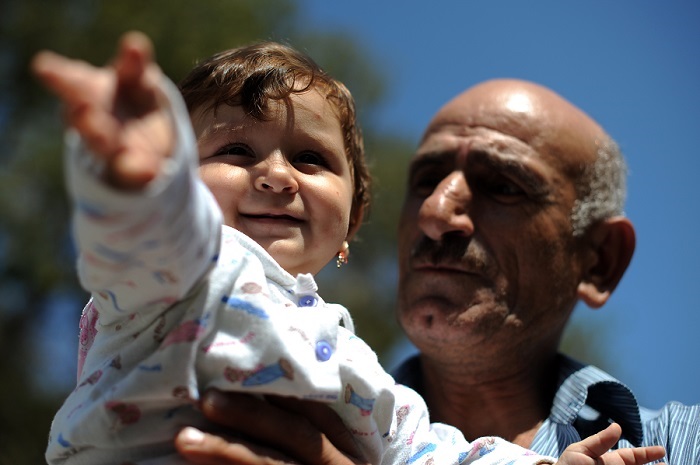Research, evidence and data
Data and research
Focused research, new metrics and methods could give a far better understanding of Healthy Ageing and are essential for evidence-informed policy and evaluation. To achieve this, appropriate measures of Healthy Ageing need to be agreed on and collected through vital statistics, health and social care services, and population surveys across countries. Research in a range of fields contributing to Healthy Ageing across the life course is also required, as are mechanisms to ensure its rapid translation into clinical practice, systems strengthening, population-based health interventions, and shaping of health and broader socio-economic policies.
To mark the start of the Decade of Healthy Ageing, a research to impact pathway draws on existing WHO strategies and takes a stepwise approach to identifying priorities, research, evidence, knowledge translation and scale up to accelerate the implementation of interventions to optimize the functional ability of older people.
Research priorities
Governments, research agencies and other key institutions need to fund and carry out research that includes and benefits older people. WHO conducted a global consultation that helped identify key research and evidence synthesis priorities in Healthy Ageing. These priorities were reviewed with key stakeholders in order to build commitment, a focused direction for future research, and the necessary resources to move the agenda forward.
Evidence
WHO has developed packages of interventions that are based on evidence and approved by WHO’s Guidelines Review Committee. This requires synthesizing evidence related to specific questions and expert appraisal. Strengthening and expanding guidance and recommendations for clinical, population or systems-level actions are needed on what works to improve the three components of healthy ageing (intrinsic capacity, environments, and functional ability). This includes actions within the health sector and with multiple sectors, that contribute to healthy ageing.
WHO technical experts along with global experts are working on priority topics to develop WHO guidelines and encourage partners to expand the evidence base on healthy ageing. Cochrane-Campbell Global Ageing Partnership created an interactive evidence gap map to identify existing primary studies and systematic review of health and social support services, as well as of assistive devices designed to support functional ability among older people who live in the community.
Metrics
To improve understanding and investment in Healthy Ageing there needs to be agreement on the indicators that need to be measured. WHO is working with users and producers of data from around the world to review current data sources and develop and agree on a set of measurements for intrinsic capacity and functional ability. This will help to identify gaps in the existing methods and metrics and develop ways that these gaps can be filled. The Decade of Healthy Ageing: Baseline Report provides an overview of comparable global data in 2020 and policy implications.
Metrics and research standards on Healthy Ageing

A portrait of an elderly person
Monitoring
What gets measured gets done. To respond effectively to population ageing, decision makers need meaningful and comparable information on the health status and functioning of older people, their health and social care needs, and their goals and aspirations. Many countries lack this information, which is a major barrier to the development and evaluation of policy and programmes from the perspective of older people. WHO is working to link existing surveys to compare the health status, needs, and unmet needs of older people, and enabling older people’s abilities to do and be what they value. Using this data, countries will be better able to prioritize their investments towards their greatest needs and optimizing functional ability.

Rustam Aliyeva, 52, holds his granddaughter, Madina in a community family settlement.
WHO's Study on global Ageing and Adult Health (SAGE)
More studies are needed on the health status of older people, especially using measurements that are comparable across countries. WHO's Study on Global AGEing and adult health (SAGE) works towards this goal, as a longitudinal study collecting data on older adults, from nationally representative samples in six countries and across four different world regions.
Find out more about SAGE
What is WHO doing?
Making progress on Healthy Ageing will require a far better understanding of age-related issues and trends. Three approaches will be crucial for improving measurement, monitoring and research. These are:
- agreeing on metrics, measures and analytical approaches for Healthy Ageing;
- documenting Healthy Ageing trajectories across the life course, including variation across and within countries; and
- conducting research to understand how to improve intrinsic capacity and functional ability across the life course in diverse contexts, involving multiple sectors (health, social, and others), and sharing evidence on what can be done to meet the distinct needs and goals of older populations
To support these approaches WHO works with a broad range of stakeholders to:
- develop normative tools, including standardized survey instruments and related manuals;
- support countries to improve their capacity to collect, analyse and use data on Healthy Ageing; and
- advance research policy for Healthy Ageing (priorities, financing, capacities and dissemination), and support multi-country efforts to improve Healthy Ageing in light of social, gender and biologic determinants, roles of health and other social systems, and broader social and economic context.
Journal articles and related publication
Longitudinal Patterns of Physical Activity Among Older Adults: A Latent Transition Analysis
Evidence for the domains supporting the construct of intrinsic capacity
Related content
Related health topic


